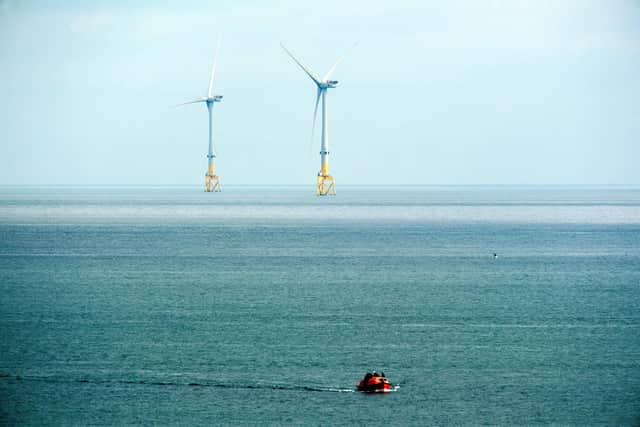Energy price crisis: Constitutional bunfight between SNP and Tories helps no one – Martyn McLaughlin
At the weekend, First Minister Nicola Sturgeon suggested the UK Government should consider nationalising energy firms to try and avert the “looming disaster” facing households up and down the country as prices rocket.
Some acute observers have noted the irony in Ms Sturgeon’s stance, which urged the UK Government to take action by “exercising the powers they have campaigned to keep in their hands” – a novel twist on the kind of criticism usually levelled at her administration by Conservative and Labour voices at Holyrood. .
Advertisement
Hide AdAdvertisement
Hide AdDevolution, and its limitations, are of course central to attempts to curb exorbitant bills, ensure those most in need are supported, and guarantee a stable energy supply for the long term.


The major levers that can make a substantive difference, such as windfall taxes on profits and regulation of the energy market, lie with Westminster. Even Boris Johnson, the captain of a ghost government lolling on the horizon, has conceded the package of support announced so far is insufficient. Naturally, that has not led to him doing anything as rash or revolutionary as helping the people of this country.
Taking into account the Ofgem energy cap and previously announced mitigations, the Scottish Government estimates that come October, around 906,000 households will be in fuel poverty. The situation is grim and, as winter approaches, it is only going to get more challenging.
It is beyond dispute that the UK Government must take the lead on this, no matter whether it is Liz Truss or Rishi Sunak at the helm. At the same time, however, it is only right that the Scottish Government comes under scrutiny too.
This winter, a new Scottish benefit, known as low-income winter heating assistance, is being brought in to replace the cold weather payments administered by the UK Government.


The existing system triggers £25 payments whenever the average temperature is recorded as, or forecast to be, zero degrees Celsius or lower for seven days in a row.
By contrast, the replacement is expected to benefit around 400,000 low-income households who will receive a guaranteed annual £50 payment, described by social security minister Ben Macpherson as a “significant increase in support”.
A crude assessment might well suggest as much, but the flat £50 sum risks leaving many vulnerable households worse off at a time when every penny counts.
Advertisement
Hide AdAdvertisement
Hide AdAge Scotland, one of several organisations to have raised concerns over the replacement initiative, points out that based on data detailing the triggers for cold weather payments in the past five years, as many as 17,000 people would receive less under the devolved benefit.
In 2020/21, some areas saw seven cold weather triggers, entitling households to £175 in payments. In previous winters, when conditions were even more extreme, some areas received up to £250 towards their bills.
Peter Kelly, director of the Poverty Alliance, Scotland's anti-poverty network, has described the new benefit as “deeply unjust,” while Citizens Advice Scotland said if the replacement payment had been in force for the past decade, some vulnerable, low-income consumers would have faced a fall in financial support by as much as 400 per cent.
There are other, far-reaching questions to be asked about other devolved powers which impact on energy bills and supply. The most obvious one is the management of offshore wind rights.
Critics of Ms Sturgeon have seized on her comments about the nationalisation of energy firms, pointing out that five years ago, her government promised to set up a publicly owned, not-for-profit energy company.
The decision to abandon such a major policy has been blamed on the pandemic, but there has been nothing in the way of an extensive explanation. The hard truth is that any firm, regardless of its ownership status, would have been hit hard by sky-high wholesale prices.
Yet some who initially supported the plans have offered up more politicised explanations, insisting that the creation of a national energy company would always be a no-go for a government without major capital borrowing powers. It is a curious argument to make, given that even more punitive fiscal restraints were in place when the policy was announced.
Instead, the government is pressing ahead with plans for a dedicated public energy agency in its place. This new entity will not be up and running until 2025 at the earliest, and details of its powers and remit are thin on the ground.
Advertisement
Hide AdAdvertisement
Hide AdDoes that mean the government has abandoned plans for a publicly owned energy firm altogether? Let us hope not, because the kind of government intervention that was mooted still has the potential to be a force for good, helping to reduce fuel poverty while spiriting Scotland towards its net-zero carbon emission targets.
Achieving those goals requires ambition and money – a great deal of it. But with some joined up thinking, it is possible.
The first round of offshore wind leasing auctions, known as ScotWind, has been carved up amongst multinational companies, investors and, in a grim irony, state-owned energy firms from abroad.
In the long-term, however, there is a chance to do things differently. What if the Scottish National Investment Bank was mobilised to help scale up Scotland’s renewables skill base and manufacturing capacity, and allow public bodies to bid for – and win – future leases?
There is a great deal that the administrations at Holyrood and Westminster can do in the short-term to mitigate the worst impacts of the energy crisis, but they should not lose sight of the need for lasting solutions.
Comments
Want to join the conversation? Please or to comment on this article.
